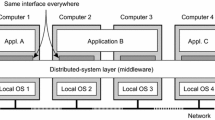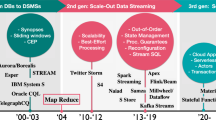Abstract
When applications must keep their data structures persistent, additional effort beyond transient modeling is necessary to realize suitable persistent storage. The most convenient approach is the use of a persistent programming language (PPL), which offers internal mechanisms for storing and loading data transparently for the application programmer. An alternative to a PPL is a universal programming language that has been extended by persistence concepts for any data types
This paper introduces an extended generic mechanism that abstracts necessary functionality for realizing persistence of any C++ object structure. First, we discuss general problems of persistent storage and the motivation for this approach. The design aspects and the reasons for special features are described in detail with the data and implementation insides. Finally, we sketch the persistent data structure and present the integration of the library in three different example programs.
Similar content being viewed by others
References
Atkinson, M.P., Morrison, R.: Orthogonal Persistent Object Systems. VLDB Journal 4(3), 319–401 (1995)
Atkinson, M.P., Bailey, P.J., Chrisholm, K.J., Cockshott, W.P., Morrison, R.: An Approach to Persistent Programming. Computer Journal 26(4), 360–365 (1983)
Bantleon, O., Eisenecker, U., Missiakas, G.,: Streams++: Portable Library for persistent Objects in C++ (German: Streams++: Portable Bibliothek für persistente Objekte in C++). In: IX-Magazin 3/1994, pp. 190–199 and 4/1994, pp. 218–222
Dolinsky, J.U.: Investigations about Persistent Storage and Dynamic Linking of Modular-Hierarchical Object Structures. Diploma thesis, University of Wismar, 1997
Gorlen, K.E., Orlow, S.M., Plexico, P.S.: Data Abstraction and Object-Oriented Programming in C++. Wiley, Chichester 1991
Morrison, R., Atkinson, M.P.: Persistent Languages and Architectures. In Security and Persistence, Rosenberg, J., Keedy, J.L. (eds.), Springer, 1990, pp. 9–28
Network Integrated Services Inc. Meijin++ Professional Version 3.0, Users’ Guide (1996)
Pawletta, T., Lampe, B., Pawletta, S., Drewelow, W.: An Object-oriented Framework for Modelling and Simulation of Variable Structure Systems. In: Proc. of Summer Computer Simulation Conference’ 96, Portland, Oregon (1996)
Stroustrup, B.: The C++ Programming Language. Addison Wesley, 1992
Zargham, M.: Computer Architecture: Single and Parallel Systems. Prentice Hall, New Jersey 1996
Author information
Authors and Affiliations
Corresponding author
Rights and permissions
About this article
Cite this article
Dolinsky, JU., Pawletta, T. Alightweight class library for extended persistent object management in C++. Software - Concepts & Tools 19, 71–79 (1998). https://doi.org/10.1007/s003780050010
Published:
Issue Date:
DOI: https://doi.org/10.1007/s003780050010




